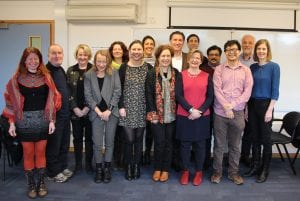Radically changing food habits with new undergraduate course
By ucyow3c, on 10 June 2017
Written by Francis Lecomber, student on UCL BASc2096
 How can we change our relationship to food? That’s been the central question for the new UCL Arts and Sciences BASc course “Citizen Science for Radical Change: Co-design, Art and Community” (BASC2096), which ran for the first-time last term. At a pop-up exhibition this week, selected students from the course showcased final projects exploring the factors that affect our decisions over what to eat.
How can we change our relationship to food? That’s been the central question for the new UCL Arts and Sciences BASc course “Citizen Science for Radical Change: Co-design, Art and Community” (BASC2096), which ran for the first-time last term. At a pop-up exhibition this week, selected students from the course showcased final projects exploring the factors that affect our decisions over what to eat.
The course brought together multiple disciplines to explore food, based on an open source interdisciplinary method developed by our lecturer Kat Austen for her project Vital. Incorporating elements of chemistry, citizen science, community co-design and philosophy, the course encouraged students to think both analytically and creatively in their approach to learning, whilst embracing the overarching theme of food as a unifier of different peoples. The learning process itself is studied throughout the course, as we were encouraged to investigate the many different forms of knowledge and the hierarchical structure in which they exist – a structure that often places quantified data far above sensory perception in terms of value. This overarching theme continuously shaped and changed our approach to knowledge acquisition.
Throughout the course, we worked with students from Newham’s NewVIc Sixth Form College, where we ran workshops and scientific experiments. At the end of the term, we co-designed exhibits and performances with the NewVIc pupils, which helped inform our personal designs for our final projects.
In these final projects, the diverse threads of the course are woven into a major design piece. These designs were exhibited here, at the UCL Art Museum, on Monday 5th June as a part of the university’s theme of Transformative Technologies. In their diversity, they capture the multiple meanings food has to us, and the effect of engaging with it in an interdisciplinary way.
 Close
Close



